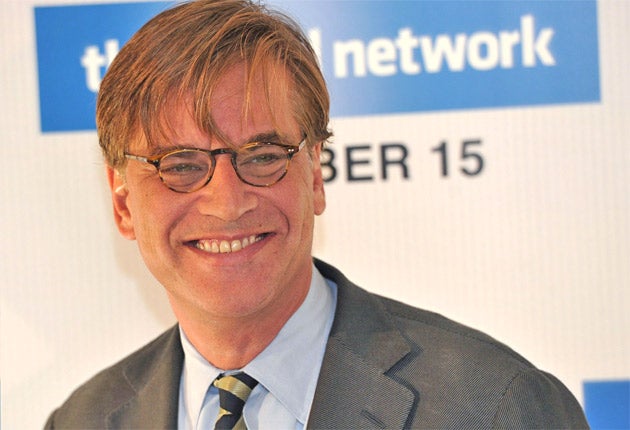Diary: A screenwriter writes

Your support helps us to tell the story
From reproductive rights to climate change to Big Tech, The Independent is on the ground when the story is developing. Whether it's investigating the financials of Elon Musk's pro-Trump PAC or producing our latest documentary, 'The A Word', which shines a light on the American women fighting for reproductive rights, we know how important it is to parse out the facts from the messaging.
At such a critical moment in US history, we need reporters on the ground. Your donation allows us to keep sending journalists to speak to both sides of the story.
The Independent is trusted by Americans across the entire political spectrum. And unlike many other quality news outlets, we choose not to lock Americans out of our reporting and analysis with paywalls. We believe quality journalism should be available to everyone, paid for by those who can afford it.
Your support makes all the difference.Aaron Sorkin, the screenwriter behind The Social Network, may not be a regular Facebook user, but he sure knows his way around a blog. Since his film's release in the US, its ecstatic reviews have been tinged with criticism of its few female characters, described by one publication as, "horrendous, like, 50s era sexist". Wounded by the claims of misogyny, Sorkin has hit back by writing a lengthy rebuttal in the comments section of television writer Ken Levine's blog.
"It's not hard to understand how bright women could be appalled by what they saw in the movie," he admitted, "[but] I was writing about a very angry and deeply misogynistic group of people."
Fair comment, but strange coming from Sorkin, who once wrote an entire episode of The West Wing about the unpleasantness of internet "commenters", a group he recently described as, "severely mentally disordered". He went on: "I wish I could go door to door and make this explanation/apology to any woman offended." Hmm. Not sure that'd be such a great idea, Aaron.
* Sebastian Faulks is yet to win or, indeed, be shortlisted for the Man Booker Prize. But he must have thought he was on the right track. "I don't enjoy British books set in the present day because they don't seem to have that depth or grandeur or weight or heft," the author (whose fiction is predominantly set in the early-to-mid-20th century) tells The Book Show, in an interview to be broadcast on Sky Arts this evening. "I'm not alone in that; if you look at the Booker Prize shortlist from last year, there wasn't a single book set in the present day. British writers seem to find it much easier to get depth and interest from writing about the past." Faulks tried to redress the balance with his latest novel, A Week in December. "We don't have a Bellow, a Roth or an Updike," he says, "so I thought, 'Let's give it a shot'." Unfortunately for Faulks, he failed to make it to the longlist once more. But I'm sure, having already recorded the interview, he was happy to see Howard Jacobson take the prize yesterday for The Finkler Question – which is, remarkably, set in the present day, and has been widely compared to, er, Roth.
* Another Booker loser, Peter Carey, can console himself with the news that his novel Parrot and Olivier in America has been nominated for a National Book Award for fiction in the US. His four rivals for the prize are all female (though two are named Lionel and Jaimy), making it yet another bit of bad news for "white male literary darling" Jonathan Franzen, who just can't catch a break. Some copies of his latest masterpiece, Freedom, were printed with errors in the text. Maybe the judges read the wrong version.
* Chris Bryant, the honourable member for Rhondda, was recently the star of a minor YouTube hit when he called Sky News presenter Kay "Hurly" Burley "a bit dim" on air. (Luckily for Bryant, the adversaries were in different studios, denying Ms Burley the opportunity to pin him against a wall and throttle him.) I fear, however, that there were few YouTube users watching BBC Parliament during Tuesday evening's debate on AV. Had there been more of them, they might have turned Bryant's latest slip of the tongue to viral gold. Reading heatedly from the Liberal Democrat election manifesto, Labour's Bryant told the House: "We're committed to abolishing safe sex!" He meant safe seats. "A Freudian slip", Bryant explained to his amused colleagues. But a rather embarrassing one for a former Church of England clergyman, once best known for posting pictures of himself in his underpants on a dating website. More tea, vicar?
* Since reporting that he'd joined the speaking circuit after the election, with a price tag of around £10,000 per evening, I hear that Alan Johnson has encountered little interest from the after-dinner crowd – despite that eminently clubbable persona. He was expected to fill a William Hague-shaped hole in the market. Perhaps in his elevated role as Shadow Chancellor he'll be more of a draw. The question is, will his new boss Miliband (E) actually allow him to take up any of those lucrative invitations?
Join our commenting forum
Join thought-provoking conversations, follow other Independent readers and see their replies
Comments